© Emilie Coudel
Forest restoration by family farmers in Eastern Amazonia—REFLORAMAZ
Over the last decade, forest restoration has gained relevance internationally as a response to climate change. In 2015, Brazil committed to recuperating 12 million hectares of cut forest by the year 2030.
In Amazonia, the state of Pará is center stage in this process, which involves restoring original forests and adopting systems that combine standing forests with agriculture. Pará alone is home to 5 million hectares of cut trees–40% of the total Brazil has committed to reforest.
Since the start of the millennium, and despite the recent increase of deforestation, favorable conditions for forest restoration have appeared in the region. They include both the creation of converging public policies resulting in greater environmental conservation and spontaneous and independent experimentation with restoration by farmers in the region.
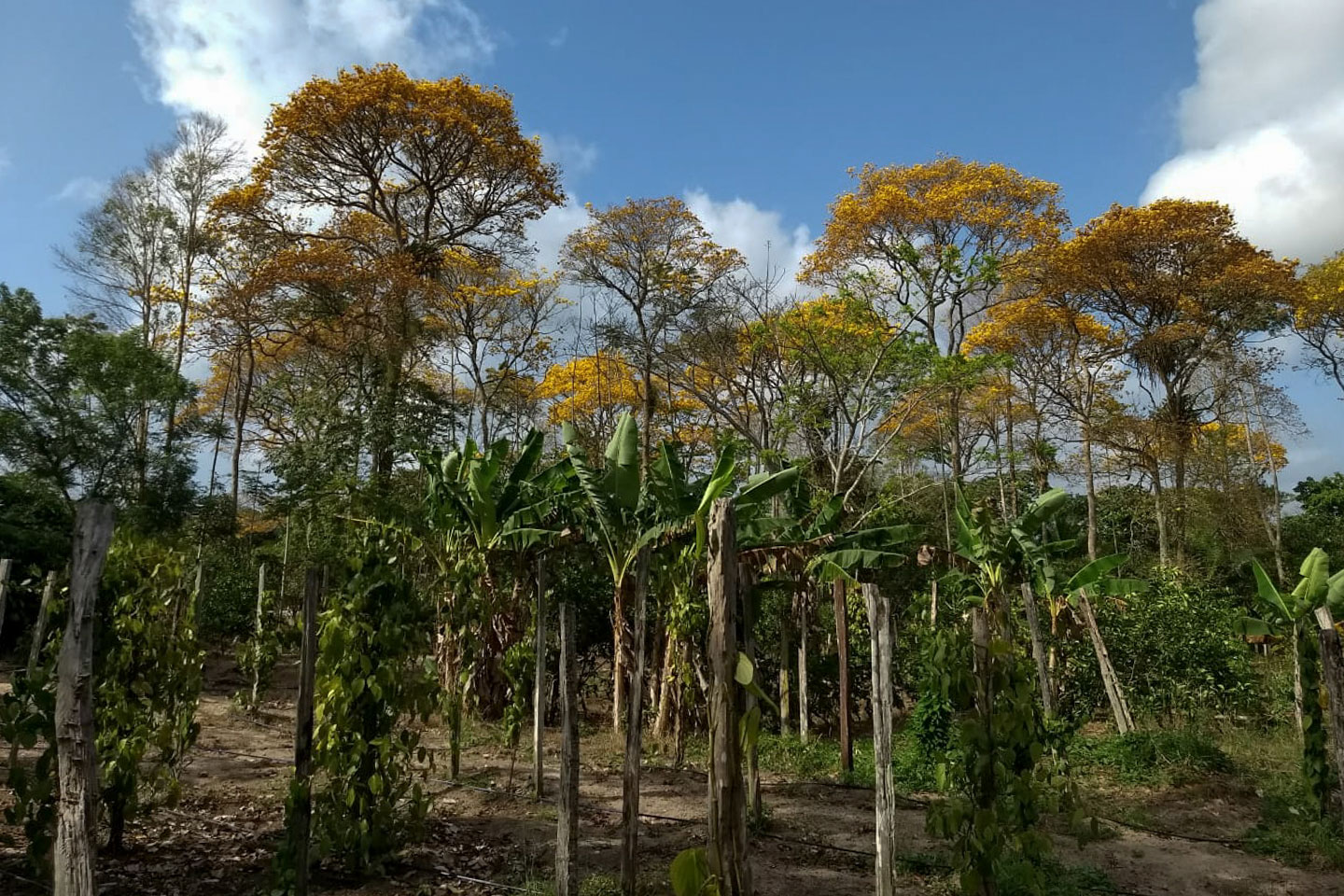
© Aurea Almeida
One of the main obstacles standing in the way of this potential growth is the fact that those involved have not been brought together to join their knowledge. Different groups—farmers, technical specialists, policy makers and scientists—have different views of how to reach a balance between socioeconomic viability and ecological benefits. Territorial accompaniment offers an opportunity to connect the different knowledge bases in this scenario, produce sharable information and build more sustainable development models.
THE TERRITORY
In northeastern Pará State, CIRAD, EMBRAPA Eastern Amazon and UFPA implemented REFLORAMAZ, a territorial accompaniment project aimed at promoting dialogue between different local stakeholders and fomenting forest restoration in the East Amazon.
The territory selected for the project lies within a circle 300 kilometers in diameter surrounding the city of Belém and includes five townships (Abaetetuba, Bragança, Capitão Poço, Irituia and Tomé-Açu). This region was chosen because managed forests and agroforestry are very old traditions there, especially alongside rivers. These towns were chosen so that different and contrasting contexts could be considered:
Abaetetuba: This municipality is composed of river islands and represents a typical Amazonian estuary floodplain where tides come and go daily. This ecosystem is favorable to the açaí palm, which is native to the region and increasingly favored among farmers.
Irituia: The culture remaining in this region from the early colonization period includes small cassava farms where agroforests are common. Farmers here have created an organic co-op that supplies markets as distant as Rio de Janeiro, and which has been supporting the spread of agroforestry.
Tomé-Açu: This municipality has become well-known for the expansion of its larger-scale commercial agroforestry. Since the 1960s, Japanese immigrants here have been investing in agroforests and grow a wide variety of products.
Bragança: Famous for the cassava flour produced here, the region has suffered from deforestation. But because of the bacuri tree (Platonia insignis) which grows abundantly in the local natural landscape, many farmers are letting the forest grow back spontaneously.
Capitão Poço: Much like Tomé-Açu, the small farmers in Capitão Poço have privileged access to the market because of nearby citrus agribusiness which has been maintaining agroforests.
ACTIONS
The aim of Territorial Accompaniment is to mobilize different stakeholders and their knowledge in a way that will lead to more sustainable development in tune with the territory’s characteristics.
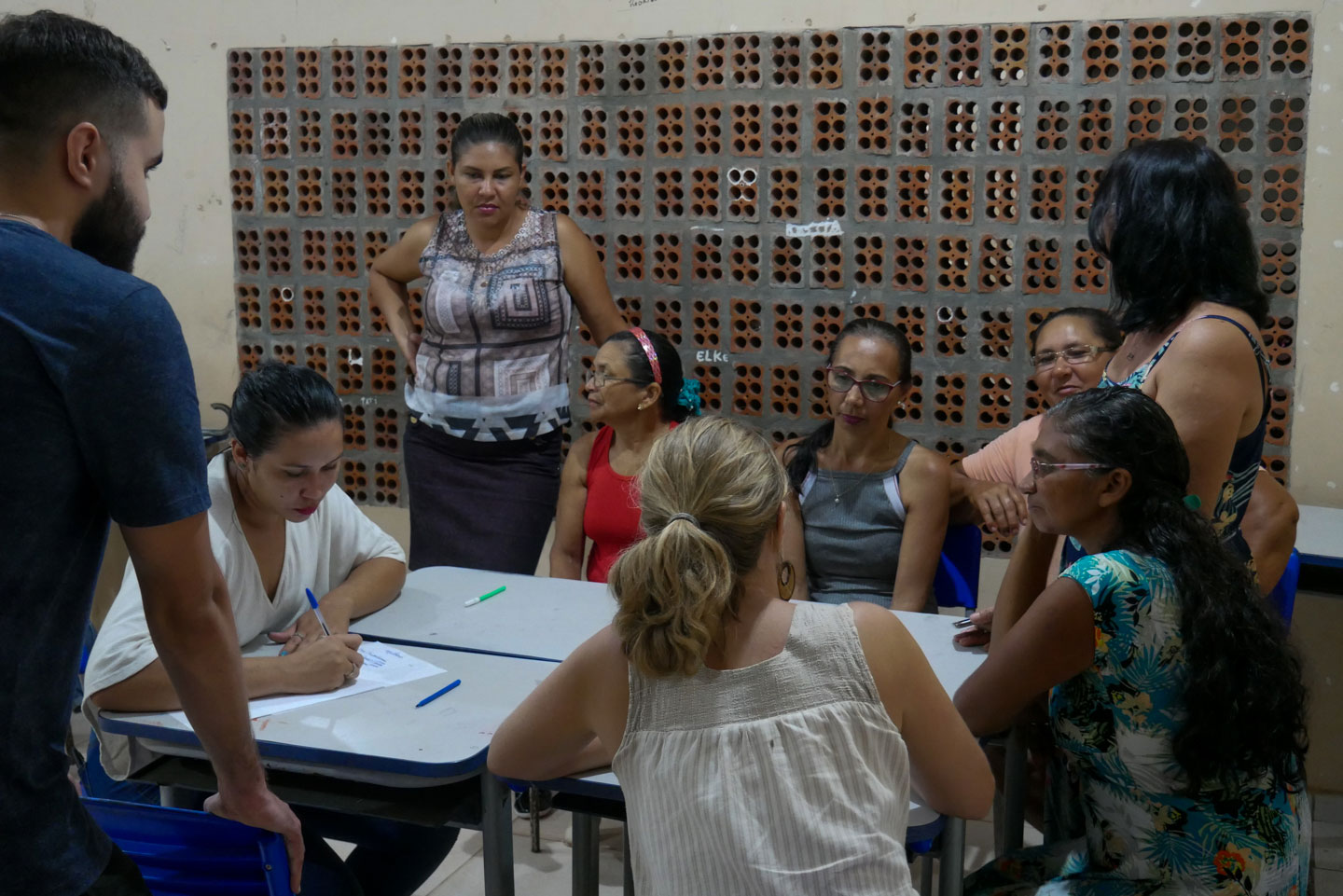
© Rodrigo Viellas
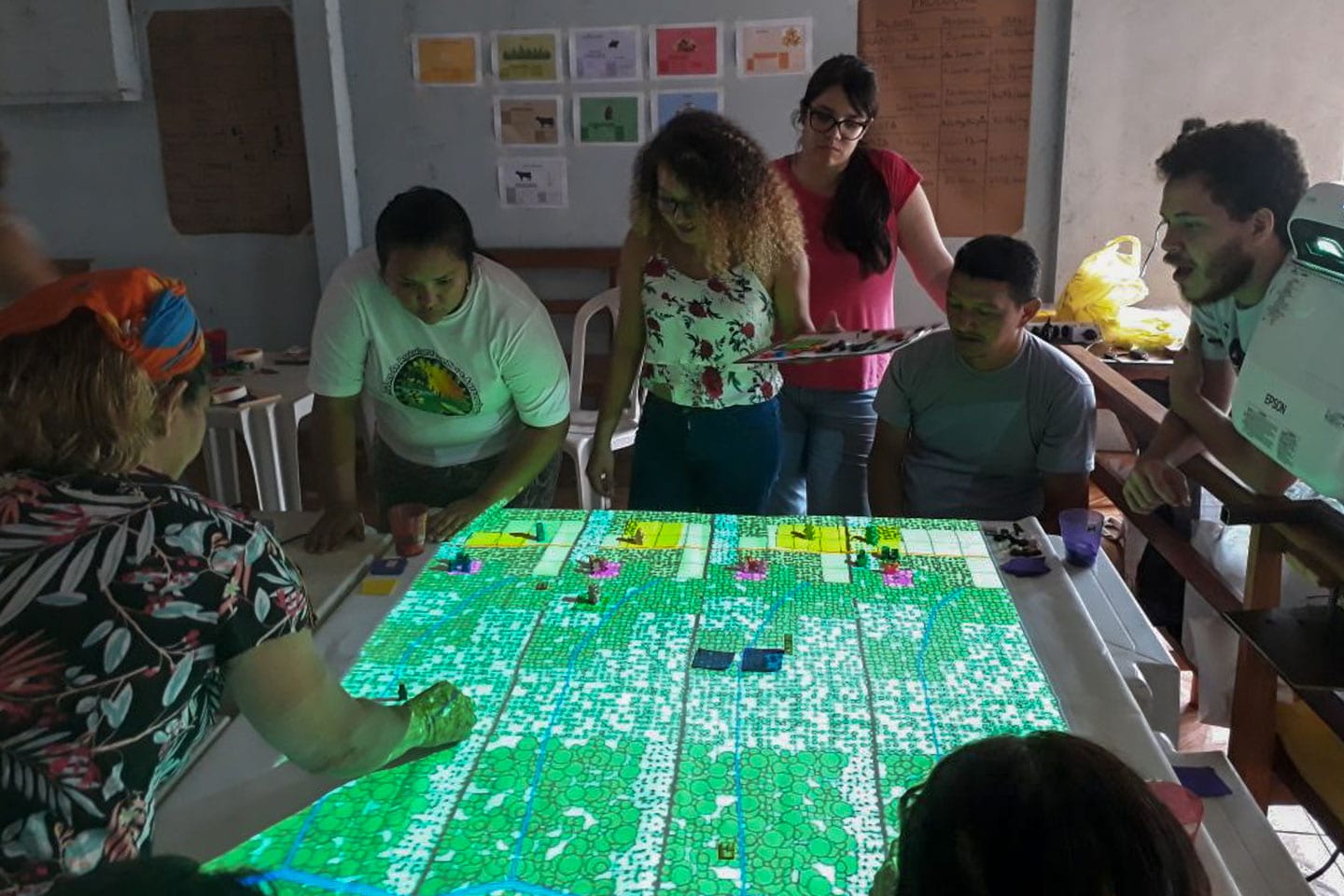
© Emilie Coudel
In the REFLORAMAZ project, the strategy was to investigate how local stakeholders understood and practiced forest restoration in order to generate sharable information. After introductory meetings, the researchers came to understand the issues that were the most important, and then studying them more deeply by means of interviews, field work and technical meetings.
Spaces were established to hold debates between stakeholders. Technical events, for example, brought out the political questions at play and opened pathways for data interpretation. Seminars provided space for farmers to share their experiences and shed light on the challenges involved with forest restoration, on the things that motivate them and on the invisible nature of the activity. The researchers also spent periods of time inside the rural communities with farmers to be able to integrate and evaluate the successes and difficulties together.
A game was also created to simulate connections between local forest restoration, the rest of the local farm system and institutions. The collective construction of this game led to interdisciplinary discussions, to horizontal relationships between researchers and farmers and to gains in terms of trust and learning. It also allowed for the co-building of social, environmental and economic indicators to evaluate the restoration projects. During the implementation phase, farmers and decision makers presented their way of defining the balance point between environmental services and social and economic benefits. This exposed the different views that exist on forest restoration. At many points in the process, the farmers were able to proudly show that they were better than the technical specialists at creating balance between the different realities, since the specialists mostly focused on economics. The simulation game led to many ideas for public policy that could promote forest restoration.
RESULTS
The REFLORAMAZ project identified a contingent of 400 farmers practicing forest restoration inside the five townships, proving restoration to be an emerging phenomenon deserving more attention from policy makers.
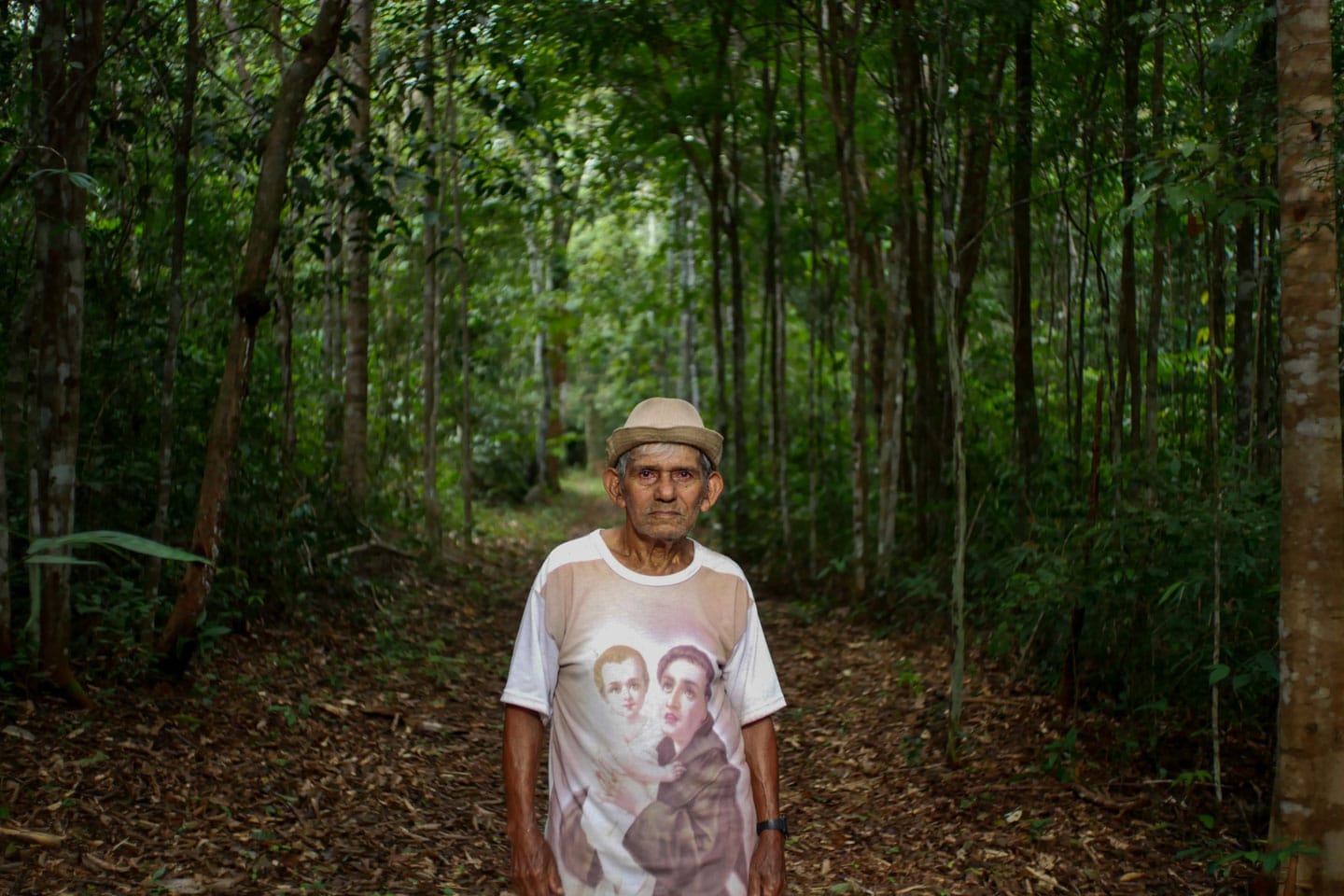
© Rodrigo Viellas
Territorial accompaniment in northeastern Pará revealed a series of previously unknown data. It became evident, for example, that 78% of the farmers interviewed already practice forest restoration by means of agroforestry, and that 83% of those maintaining agroforests also promote regeneration of the surrounding land. One interesting piece of data is that, for most of these farmers, forest restoration is not their main focus, but rather something they do because they perceive it to be the best economic strategy. The process identified agroforests up to 50 hectares in size that occupied 100% of the farmer’s property.
The Accompaniment also showed that there are different agroforestry systems in use, and that each has a different impact. There are practices based on ecological principles and others based on external inputs. Some practices are more natural and biodiverse, and some are simplified practices that result in the use of artificial methods and external inputs. Still, all processes are dynamic and simpler ones can gradually evolve to complex ecosystems from a biological point of view.
The researchers involved young people from rural schools to create the game, encouraging them to become interested in their parents’ work. Contributing to the education of young farmers and students is strategic because they will work in favor of forest restoration and have a better vision of how to get support and work with family farmers.
REMAINING QUESTIONS
REFLORAMAZ indicated actions that may be developed for the expansion of forest restoration. Raising awareness about biodiversity’s role in the restoration of environmental services and valuing and supporting the knowledge developed by the farmers themselves are key to bolstering the process. Government should invest in lines of credit for initial investment through technical assistance or interventions to expand markets. One example is the acquisition of agroforestry products as part of public-school lunch programs or family food assistance programs, which has been encouraging the creation of family farm cooperatives.
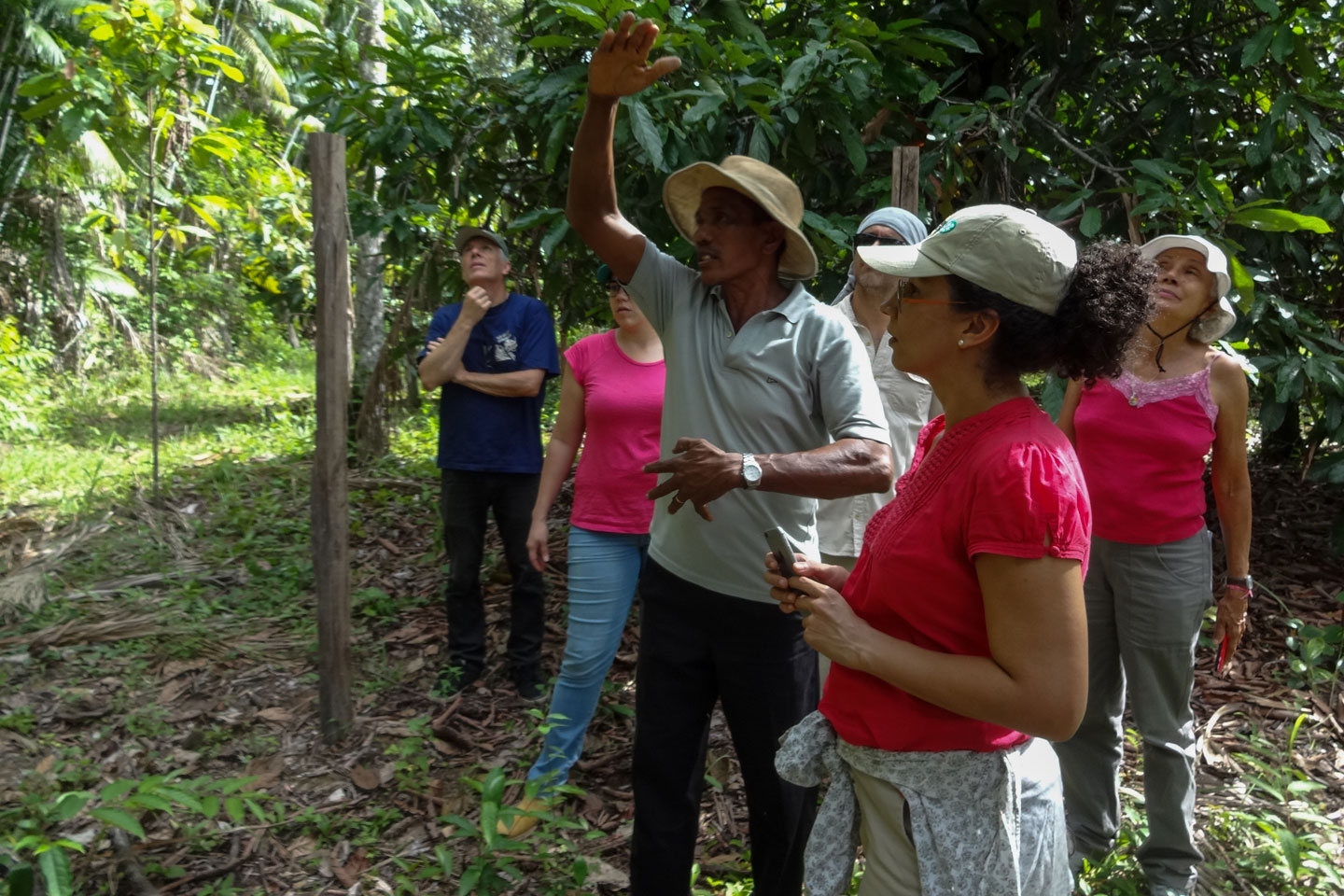
© Emilie Coudel
Territorial Accompaniment is a continually evolving process. Because of this, many topics remain to be studied in the REFLORAMAZ project together with local stakeholders in order to address unresolved issues.
Maintenance of the network created by REFLORAMAZ is essential for the permanent construction of a new economic and environmental perspective inside this Amazonian territory.
PROJECTS
-
- Refloramaz (2017-2019), financed by the Agropolis Foundation-EMBRAPA
- Recuperamaz (2017-2019), financed by CNPQ and CAPES
- Sustenta & Inova (2021-2024), financed by the European Union (Desira)
PARTNER INSTITUTIONS

FINANCING

PUBLICATIONS
Sistemas agroflorestais associados à regeneração natural: alternativas praticadas por agricultores familiares de Tomé-Açu, Pará. Oliveira Neto, M., Navegantes Alves, L. de FN, & Schwartz, G. . 2022. Sustentabilidade em Debate , 13 (1), 286. https://doi.org/10.18472/SustDeb.v13n1.2022.40855
Co-production of ecosystem services through agricultural practices: perception of stakeholders supporting smallholders in the Brazilian Amazon. Resque Antonio Gabriel Lima, Piketty Marie-Gabrielle, Coudel Emilie, Messad Samir, Le Page Christophe. 2021. Cahiers Agricultures, 30:20, 11 p. https://doi.org/10.1051/cagri/2021006
Discussing ecosystem services in management of agroecosystems: A role playing game in the eastern Brazilian Amazon. Resque Antonio Gabriel Lima, Perrier Eva, Coudel Emilie, Galvão Layse, Fontes João Vitor, Carneiro Renan, Navegantes Lívia, Le Page Christophe. 2021. AgroForestry Systems, 15 p. https://doi.org/10.1007/s10457-021-00633-7
Forest restoration in the floodplains of the Amazon estuary subjected to intensive açaí management. Carvalho, R. ; Navegantes Alves, L. ; Carneiro, R. 2021. Ambiente & Sociedade, v. 24, p. e02963-24. https://doi.org/10.1590/1809-4422asoc20180269r3vu2021L2AO
Coudel Emilie, Ferreira Joice, Navegantes Lívia, Le Page Christophe. 2020. Final report of Refloramaz project: Forest restoration by smallholders in the Eastern Amazon: how to improve the balance between environmental and socioeconomic benefits?. Montpellier : CIRAD, 38 p. https://agritrop.cirad.fr/596543/
Caracterização dos processos de recuperação florestal em matas ciliares realizados por agricultores familiares da região de Itabocal, Irituia – Pará. Costa, D. M. ; Navegantes-Alves, L. . Geoambiente online, v. 37, p. 181-201, 2020
Transformações na trajetória dos sistemas agroflorestais no município de Irituia – PA. Braga Layse de Nazaré Gonzaga, Navegantes-Alves Livia de Freitas, Coudel Emilie. 2020. Revista IDEAS, 14 (1):e020009 : p. 23. https://revistaideas.ufrrj.br/ojs/index.php/ideas/article/view/272
Agrobiodiversity and public food procurement programs in Brazil: Influence of local stakeholders in configuring green mediated markets. Resque Antonio Gabriel Lima, Coudel Emilie, Piketty Marie-Gabrielle, Cialdella Nathalie, Sá Tatiana, Piraux Marc, Assis William, Le Page Christophe. 2019. Sustainability, 11 (5):1425, 22 p. https://doi.org/10.3390/su11051425
Diversidade de experiências de recuperação florestal praticada por agricultores familiares do Nordeste do Pará. Carneiro, R. V. ; Navegantes Alves, L. 2019. Geoambiente online, v. 35, p. 293-314. https://doi.org/10.5216/revgeoamb.v0i35.57152
Motivações de agricultores familiares para participarem de ações de recuperação florestal em Paragominas, Pará. Costa Bessa Mayara Suellen, Nunes Ferreira Joice, Coudel Emilie, Da Silva Fernando Elias, Romagnoli Federica. 2019. Agricultura Familiar, 13 (1) : 9-27. https://doi.org/10.18542/raf.v13i1.7414
Agroflorestas como estratégia de recuperação: Motivações de agricultores familiares em fazer recuperação ambiental no Nordeste Paraense. Coudel Emilie, Carneiro Renan, Navegantes Lívia, Ferreira Joice, Carvalho Rosileia. 2018. SOBRE. Belo Horizonte : Sociedade Brasileira de Restauração Ecológica, 1 p. SOBRE 2018: Conferência Brasileira de Restauração Ecológica. 2, Belo Horizonte, Brésil, 21 Novembre 2018/23 Novembre 2018. https://agritrop.cirad.fr/593353/
Compartilhamento de conhecimentos sobre sistemas agroflorestais entre agricultores familiares e estudantes através do uso de um jogo. Le Page Christophe, Perrier E., Coudel Emilie, Resque Antonio Gabriel Lima, Galvão Layse, Garcia V., Navegantes-Alves Livia de Freitas. 2018. Belo Horizonte : Sociedade Brasileira de Restauração Ecológica, 1 p. SOBRE 2018: Conferência Brasileira de Restauração Ecológica. 2, Belo Horizonte, Brésil, 21 Novembre 2018/23 Novembre 2018. https://agritrop.cirad.fr/590459/



